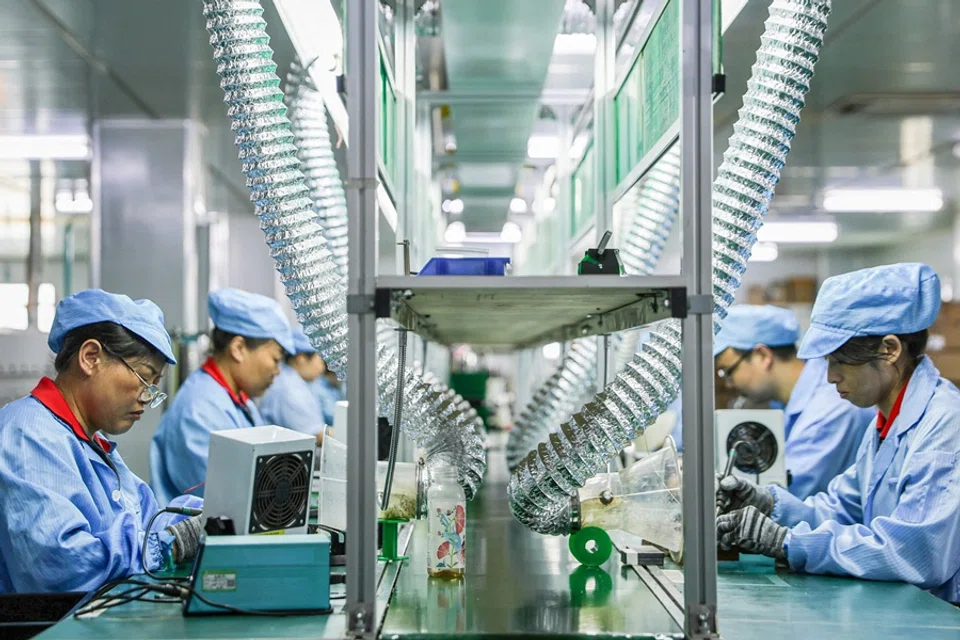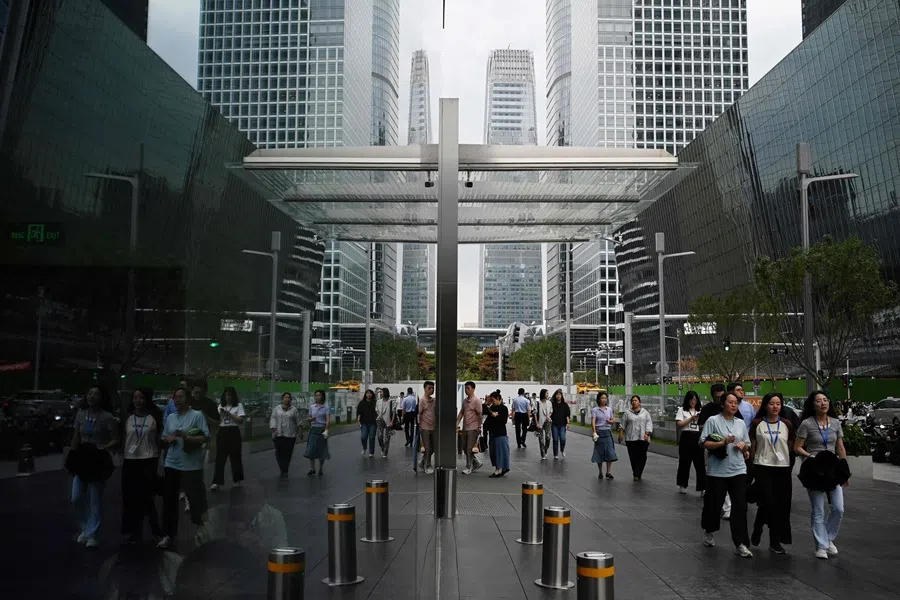Why China’s workforce is ditching social security — and hiring retirees instead
Widespread distrust in China’s social security system is driving an unusual labour market shift. From employers to workers, many doubt the system will protect their future — fuelling a surge in retiree hiring and revealing deeper anxieties about economic security. Lianhe Zaobao correspondent Li Kang reports.

“Started working at 22, laid off at 35, rehired at 50 — that’s the peculiar reality of China’s workforce.”
With China set to enforce mandatory social security contributions, jokes and commentaries are flooding the Chinese internet, largely focused on two age groups: middle-aged job seekers facing dual pressures of shrinking salaries or even layoffs, and retirees — who are exempt from social security contributions — becoming hot commodities in the job market.
Surge in job openings for retirees
In early August, China’s Supreme People’s Court issued a judicial interpretation stating that, from 1 September, informal agreements between employers and employees to opt out of social security contributions will be deemed invalid. The announcement sparked heated debate online about elderly employment, with “McDonald’s hiring retirees” even trending on Weibo.
Some netizens joked, “We’d still be working into our 70s and 80s, and would need to take time off to celebrate our 60th birthday”.
Others expressed frustration over retirees returning to the workforce: “Why can’t retirees just enjoy their pensions instead of competing with young people for jobs?”
... a bakery chain in Shanghai is hiring cashiers with a base salary of 4,500 RMB, plus commissions and performance bonuses, along with overtime pay on public holidays. The only non-negotiable: applicants must hold a retirement certificate.

Although McDonald’s quickly clarified that hiring retirees was not a new practice, a review by Lianhe Zaobao of various job sites and social media platforms found that numerous listings for positions such as servers, shop assistants, file clerks, finance workers and security guards were posted in the first two weeks of August. These roles offered monthly salaries ranging from 3,000 to 6,000 RMB (approximately US$420 to US$840), shortly after the Supreme Court’s judicial interpretation was announced.
While there is no data yet on how many jobs have actually opened up for retirees, the anxiety and debate sparked by the new judicial interpretation is obvious.
Compared with low-paying white-collar jobs that often involve the gruelling “996” (working from 9am to 9pm, six days a week) schedule, roles aimed at retirees tend to offer more flexible hours and require less mental effort. For instance, a bakery chain in Shanghai is hiring cashiers with a base salary of 4,500 RMB, plus commissions and performance bonuses, along with overtime pay on public holidays. The only non-negotiable: applicants must hold a retirement certificate.
Hiring retirees = half the labour costs
For low-margin small businesses like those in the food and retail sectors, the economic benefits of hiring retirees are clear. Take Shanghai as an example: employing a regular worker costs a company about 2,800 RMB per month in social security contributions. Even with the city’s 2025 minimum wage of 2,740 RMB, the employer must still pay at least 5,540 RMB per month. Since retirees are exempt from social security contributions, businesses can save nearly half their labour costs by hiring them.
Ms Cheng, who runs a small eatery in Shanghai, admitted in an interview that mandatory social insurance contributions place a significant burden on her business. She would often hire family members instead to sidestep these payments and cut costs.

Social media is filled with similar stories. A Qingdao netizen posted that after the new rules were announced, their company “brazenly stopped making social security contributions”. Another Sichuan netizen helplessly shared that their mother’s employer bluntly told its staff to either pay for their own social security or quit.
Social security underpayment is widespread
Mr Liu, who works in the construction industry, told Lianhe Zaobao that many small companies typically hire workers ad hoc during peak seasons to avoid social security obligations. Mid-sized companies often adopt a “minimum coverage” approach: they make social security contributions only for key employees — required for bidding compliance or financial credit scoring — while treating the rest as temporary workers covered solely by group accident and injury insurance.
“I honestly don’t even want to make contributions to my social security,” she said. “There’s no guarantee I’ll get anything back. By the time I retire, there might not be many people left paying into the system.” — Wang Yuxi (pseudonym), a 29-year-old employee in Wuhan
Underpayment of social security is common in China. A survey by HR service provider 51shebao of 6,125 companies nationwide found that only 28.4% fully comply with social security contribution requirements. Meanwhile, 28.2% contribute based on the minimum threshold, and 22.0% calculate contributions only on fixed base salaries, excluding bonuses.
Wang Yuxi (pseudonym), a 29-year-old employee in Wuhan, is among those whose social security contributions have been underpaid. She told Lianhe Zaobao that although the minimum monthly contribution base in Wuhan is 4,494 RMB, two of her previous employers only paid about 10% of the local minimum wage for her social security — less than 200 RMB per month.
Still, Wang was not bitter about it. “I honestly don’t even want to make contributions to my social security,” she said. “There’s no guarantee I’ll get anything back. By the time I retire, there might not be many people left paying into the system.”

Her concern is not unfounded. As more people over 60 reach retirement age, China is experiencing its largest retirement wave so far, with over 20 million people retiring each year. Meanwhile, record-low birth rates mean fewer future contributors to the pension system.
The China Pension Actuarial Report 2019-2050, released by the Chinese Academy of Social Sciences in 2019, predicted that China’s pension fund could start running deficits in 2028 and become insolvent by 2035.
Short-term pain, long-term gain
Fu Fangjian, an associate professor at Singapore Management University (SMU)’s Lee Kong Chian School of Business, told Lianhe Zaobao that mandatory social security contributions will inevitably trigger conflicts among various parties. He outlined several potential outcomes: employers and employees may need to renegotiate social security cost-sharing, some workers might change jobs, companies might opt to hire retirees (who are exempt from social insurance contributions), and rising cost pressures could even force some small businesses to close.
“... ordinary people still lack the purchasing power — ultimately because their incomes haven’t risen. Many are just getting by, with no real safety net.” — Associate Professor Fu Fangjian, Lee Kong Chian School of Business, SMU
He said that while some business closures are unavoidable during this adjustment, they should be in the minority. Most enterprises will simply have to bear higher labour costs. Although hiring retirees can reduce expenses in the short term, it may also lead to hidden costs such as reduced productivity.
Fu pointed out that China’s early economic rise was driven by a sweatshop model coupled with cheap labour, but this came at the cost of persistently low wages and weak domestic demand. “Chinese goods are affordable and high-quality,” he said, “but ordinary people still lack the purchasing power — ultimately because their incomes haven’t risen. Many are just getting by, with no real safety net.”

He believes that as the economy develops, the government needs to guide and correct the income distribution structure. While mandatory social security contribution is different from the minimum wage policy, it essentially serves a similar function.
He explained that mandatory social security enhances the basic protection of workers, and helps boost domestic demand and support internal circulation. It also reflects a form of supply-side reform, marking a shift away from China’s export-led growth model towards one driven by domestic demand, where workers share more in the growth dividends.
However, Fu noted that this transition will not happen overnight and will require time and systemic effort. But from the perspectives of national security and economic development, he emphasised that if China truly wants to become a developed country, the key is to make its people more prosperous. “If wages stay depressed over the long term, then it’s certainly not a developed country,” he said.
This article was first published in Lianhe Zaobao as ““中年裁员老年上岗” 强制社保催化中国职场代际困局”.

![[Big read] Paying for pleasure: Chinese women indulge in handsome male hosts](https://cassette.sphdigital.com.sg/image/thinkchina/c2cf352c4d2ed7e9531e3525a2bd965a52dc4e85ccc026bc16515baab02389ab)


![[Big read] How UOB’s Wee Ee Cheong masters the long game](https://cassette.sphdigital.com.sg/image/thinkchina/1da0b19a41e4358790304b9f3e83f9596de84096a490ca05b36f58134ae9e8f1)
